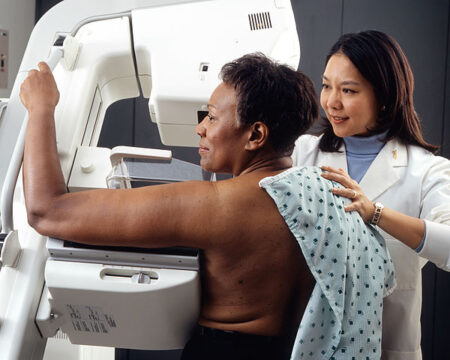As you probably know by now, October is Breast Cancer Awareness Month. What does this mean for most of us? After all, it would be hard to find anyone who is unaware of breast cancer since it affects 1 in 8 women, or 12.5% of the population (breast cancer also occurs in men, but the rate is much lower, about 1 in 833). In fact, as of this year, breast cancer is the most common cancer globally, and my guess is that you know someone who has had breast cancer.
For me, this month means that it’s time to remind people that this disease is a killer, and the best way to fight it is through early detection. When I was in my mid-40s, I was diagnosed with stage-3 breast cancer and underwent a mastectomy, months of chemotherapy and radiation, and reconstructive surgery. It was brutal, and 11/10, I do not recommend it, so don’t be me! I put off mammograms for a couple of years because I was in grad school and “too busy,” and in that short amount of time, an invasive tumor grew and spread to 13 of my lymph nodes. If I had been screened on a regular schedule, it could have been caught much earlier, and my treatment options would have been less, shall we say, unpleasant.

Woman receiving a mammogram. Photo credit: Rhoda Baer, National Cancer Institute. Image in the public domain.
For women, a monthly self-exam is highly recommended, but it’s not enough to keep you safe. If you are 40 or older, talk to your doctor about starting a regular annual schedule of mammograms. Some women who have been through these screenings describe them in a way that makes them sound scary or awful, but they really aren’t! A mammogram generally takes only around 5-10 minutes, and the minor discomfort is highly preferable to the possibility that you are one of the 12.5%, and the cancer has gone undetected for another year. If you’ve been putting this off, heed my advice and go get screened.
Since this is the Emory Libraries blog and I am a librarian, I also want to highlight some of the resources we have that may be helpful if you want to learn more. As a university with nursing, public health, and medical schools, we are fortunate to have the best resources at our fingertips, so a wealth of information is available to you.
Resources for patients and caregivers
- Radical: The Science, Culture, and History of Breast Cancer in America (2019) by Kate Pickert
- Breast Cancer Clear & Simple: All Your Questions Answered (2016) by the American Cancer Society (available as an ebook in English and Spanish)
- Dr. Susan Love’s Breast Book (2015) by Susan M. Love
- Surviving Triple Negative Breast Cancer: Hope, Treatment, and Recovery (2013) by Patricia Prijatel
- Medline Plus: Breast Cancer
If you have trouble wading through all the information online (websites, databases, blogs, etc.) and figuring out which resources provide reliable and accurate information, ask your doctor if a library is available at your treatment site where you can work with a librarian to find the information you need.
Resources for those interested in the latest research
- The Future of Prevention and Treatment of Breast Cancer (2021) by Jose Russo (available as an ebook)
- PubMed is the best place to search for journal articles, which will have the most current information and research results.
- PubMed Clinical Queries uses predefined filters to help you find the most relevant research for therapy, clinical prediction guides, diagnosis, etiology, and prognosis.
by Jody Bailey, Head of the Scholarly Communications Office, Emory Libraries

I appreciate your efforts in spreading awareness about breast cancer. It’s not just about pink ribbons; it’s about knowing the signs and symptoms and taking action. Great work in promoting early detection!